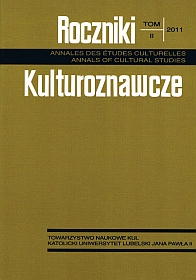The Essence of the Theatre
Abstract
The author of the article, assuming that the theatre, already in Ancient Greece, was connected with co-participation of persons constituting the community of polis, calls for equal recognition of the idea of man, who creates the theatre and who visits it, in the contemporary outlook upon the theatre. The relational dimension of the theatre has existed since antiquity when it was strictly connected with a political and religious function uniting the community and reached the point of contemporary perception of the theatre as an independent art. The most crucial outcome resulting from the combination (theatre and anthropology) shows the art of theatre as a place of forming the conception of the world as a performance (suggestions of H.U. von Balthasar and of H. Gouhier, of J. Tischner, of A. Krąpiec). On the stage, theatre audience can find a metaphorical image of his or her life, of general fate of a man portrayed as a tragic being, suspended between life and death. Independently of the kind of performance given on the stage (comedy, tragedy, farce), a relation between the actor and theatre audience is a clue issue of the theatre. The author also shows the genesis of theatre formation, outlines the notion of the actor, stage acting, theatre roles, scenes and of theatre audience participation. Because the theatre as an art form does not have a stiff pattern, it acquires its shape at a concrete point of time during the stage performance (in statu nascendi). Therefore it requires the presence of theatre audience throughout the whole time of its duration. Because of that aspect, it is fundamentally personalistic at its roots. If a stage performance is not viewed on the grounds of personalistic categories, it stops being called the theatre and turns into a show devoid of personalistic relationships.
References
Bartnik Cz.: Dogmatyka katolicka, T. 1, Lublin 1999.
Bartnik Cz.: Personalizm, wyd. II poprawione i poszerzone, Lublin 2000.
Claudel P.: Możliwości teatru, wybór i wstęp Irena Sławińska, przekład Maria Skibniewska, noty Maria Uchańska, Warszawa 1971.
Czerwińska J.: Co nam zostało z teatru antycznego?, [w:] Dylematy dramatu i teatru u progu XXI wieku, red. Anna Podstawka, Agnieszka Jarosz, Lublin 2011.
Von Balthasar H.U.: Teodramatyka. T. 1: Prolegomena, przekład M. Mijalska, M. Rodkiewicz, W. Szymona OP, Kraków 2005;
Von Balthasar H.U.: Teodramatyka. T. 2: Osoby dramatu, cz. 1: Człowiek w Bogu, przekład Wiesław Szymona OP, Kraków 2006,
Von Balthasar H.U.: Teodramatyka. T. 2, cz.2: Osoby w Chrystusie, przekład Wiesław Szymona OP, Kraków 2009.
Kaczmarek W.: Od kontestacji do relacji. Człowiek wobec Boga w dramacie Młodej Polski, Lublin 2007.
Kawalec A.: Partycypacja jako próba wyjaśnienia faktu teatralnego, „Ethos” 2007 nr 77-78, s. 243-252.
Kawalec A.: Znak osobowy człowieka a istota teatru, [w:] Codzienne pytania Antygony, red. ks. A. Szostek, ks. A. Wierzbicki, Lublin 2001.
L’Essence du théâtre, Paris 1934; Le théâtre et l’existence, Paris 1952;
Limon J.: Między niebem a sceną. Przestrzeń i czas w teatrze, Gdańsk 2001.
Ratzinger J., Znaczenie osoby w teologii, tłum. Robert Skrzypczak, “Personalizm” 2005 nr 8, s. 35-48.
Sławińska I., Czytanie dramatu [w:] I. Sławińska. Odczytywanie dramatu, Warszawa 1988.
Sławińska I.: Świat jako spektakl, [w:] Sławińska. Moja gorzka europejska ojczyzna, Wybór studiów, oprac. Olimpia Sieradzka, Warszawa 1988.
Sławińska L.: Teatr w myśli współczesnej. Ku antropologii teatru, Warszawa 1990.
Tischner J.: Filozofia dramatu. Wprowadzenie. Paris 1990. Wydanie krajowe: Kraków 2001.
Witkiewicz S. I.: Czysta Forma w teatrze, wybór, wstęp i noty Janusz Degler, Warszawa 1977.
Wojtyła K.: Miłość i odpowiedzialność. Studium etyczne. Lublin 1960.
Wojtyła K.: Osoba i czyn oraz inne studia antropologiczne, Lublin 2000.
Wojtyła K.: Uczestnictwo czy alienacja? [w:] K. Wojtyła. Osoba i czyn oraz inne studia antropologiczne, Lublin 2000.





